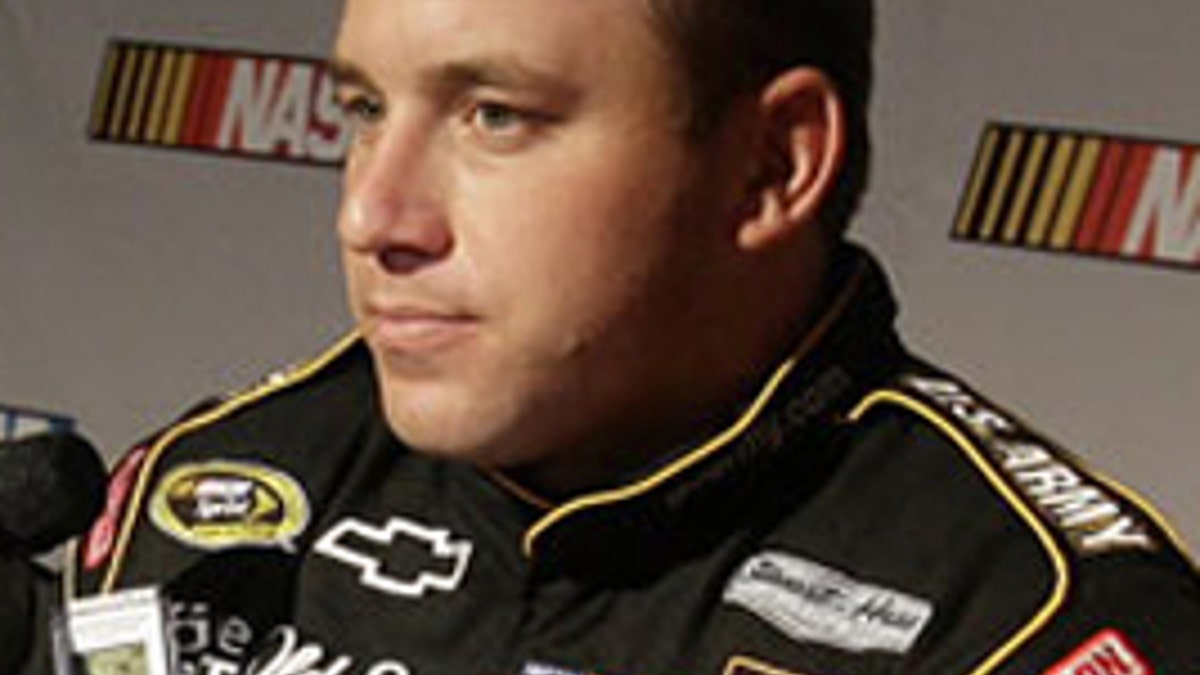
NASCAR driver Ryan Newman (GoArmy.com)
Minnesota Democratic Rep. Betty McCollum is offering an amendment to the House's federal budget bill that would strip Army sponsorship of a NASCAR vehicle, saying that Republicans who want to tackle excess spending should look to the millions spent on racing.
But NASCAR backers say McCollum ignores the value of the dollar spent at NASCAR. According to Col. Derek W. Crotts, who manages the Army's NASCAR marketing and advertising program, nearly one-third -- 46,000 -- of the 150,000 leads Army recruiters get each year come from motorsports events.
McCollum's amendment, introduced Wednesday, would prevent the U.S. Army from spending $7 million on NASCAR and $5 million on drag racing in 2011 as well as millions more by the Air Force and Navy.
"Taxpayer-funded NASCAR race cars are an absurdity at a time when the Republican-Tea Party is cutting federal support for homeless veterans, law enforcement officers and firefighters. I know NASCAR fans are passionate and patriotic. This amendment gets the government out of NASCAR and gives them the opportunity to encourage the private sector to demonstrate its patriotism by donating a military sponsorship," McCollum said in a release.
McCollum, who appeared with Muppet characters at a press conference Wednesday to push for continued funding of public broadcasting, argued that too much money is being spent by the government on racing. She noted that the tax deal reached between Republicans and President Obama at the end of 2010 grave breaks to track and facilities owners to fund capital projects at a cost of $40 million.
She added that her amendment won the support of the Citizens Against Government Waste, whose president, Thomas Schatz, called the NASCAR funding "profligate government-funded programs that Americans do not need and taxpayers simply cannot afford."
But in terms of spending, supporters of NASCAR say the Army's sponsorship more than pays for itself.
Ryan Newman, who drives the U.S. Army car No. 39 in the NASCAR Sprint Cup race, issued a statement Wednesday telling fans to contact Congress to urge it continue paying for NASCAR participation.
"In a 2009 study among fans nationwide, 37 percent feel more positive about the Army due to its involvement in motorsports. Last year alone, the U.S. Army's motorsports programs generated more than 46,000 qualified leads, more than 1,300 pledges of support from key business and community leaders and more than 484 million media impressions (34 million of which offered specific Army recruiting messages)," he wrote.
Crotts told FoxNews.com that attending motorsports events is more than just decorating a car with Army decals. The Army actively recruits by setting up displays similar to what would be seen at other industry trade shows so that potential recruits can see the vehicles and other equipment the Army employs on a daily basis.
He added that NASCAR is "an extremely effective element" of the Army Accession Command's effort.
"Youth surveys show that motorsports is a passion point for young Americans. It is critical that the Army use these passion points to communicate with prospects and their influencers. Motorsports is one of the few areas where both prospects and influencers share a high degree of interest. For more than a decade, these sponsorships have allowed us access to schools, venues and influencers that we have been unable to penetrate on the same scale through any other effort," he said.
The military and racing have been closely tied for years. The U.S. Army began its motorsports program in September 2000 when Congress directed the secretary of the Army to conduct a five-year outreach test. It was so successful, the Army expanded to NASCAR in 2003.
Drivers like Dale Earnhardt Jr. and David Stremme and Jeff Gordon have all had sponsorship from the National Guard and Air National Guard. This season, dragster Tony Schumacher will Army sponsorship for his 11th year.
The Air Force, Navy, Marines, Army and Coast Guard have all previously sponsored cars, though most no longer do. Aside from vehicle sponsorship, the Army does educational outreach at motorcross events aimed at high school, vocational and junior college students focusing on career planning, goal setting and career opportunities in motorsports and the Army.












































